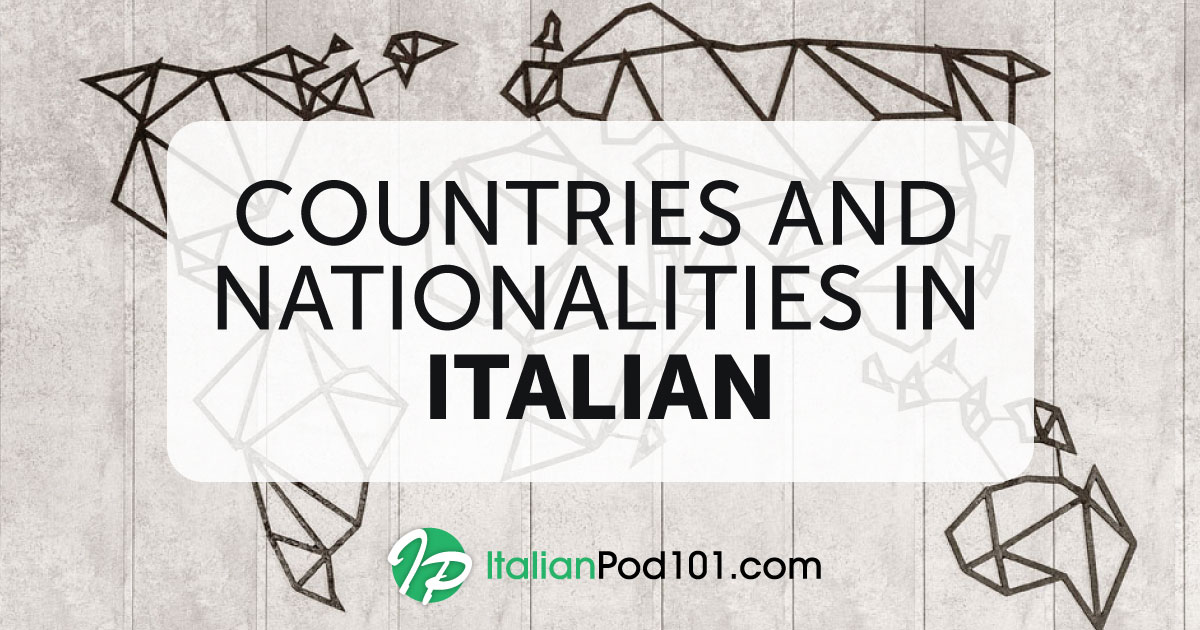
How often do you need to check the time every day? Telling the time is part of everyday life, so if you’re making plans for a specific time and date while traveling or studying in Italy, it’s essential that you master this conversation skill as soon as possible.
In this article, I’ll be going over everything from how to say “hour” in Italian to asking for the time and making plans in Italian. Let’s get started.
Che ore sono? è ora di iniziare a divertirsi con ItalianPod101.com! (“What time is it? It’s time to start having fun with ItalianPod101.com!”)
 Table of Contents
Table of Contents
- How to Ask for the Time in Italian
- Italian Hours
- Give Me a Minute…
- How to Divide Hours into Minutes in Italian
- General Time References of the Day in Italian
- Top Italian Time Adverbs
- Italian Proverbs and Sayings about Time
- Conclusion
1. How to Ask for the Time in Italian

To start, let’s see the very first basic phrases you can use to ask for and say the time in Italian:
- Che ore sono? / Che ora è?
These literally translate to “What hours are they?” and “What hour it is?” respectively. They both mean “What time is it?”
This is the easiest way to ask the time in Italian. With this phrase, you don’t have to worry too much about using formal vs. informal speech, as adding scusi (“excuse me” – formal) or scusa (“excuse me” – informal) at the beginning of the sentence can make it more formal or informal.
- Potrebbe/Potresti dirmi l’ora?
This translates to “Could you (formal/informal) tell me the time?”
This is a more complex form of asking for the time in Italian. It can be used both formally and informally as long as you change the person (2nd vs. 3rd) of the subject accordingly.
- A che ora è…? /A che ora comincia…?
These translate to “At what time is…” and “At what time starts …?” respectively. This is the Italian formula for asking when something (a meeting, a show, etc.) is going to start.
Did you notice that in Italian we say ore, literally meaning “hours,” when we talk about time? If you look up ora (“hour” in the singular) in an Italian dictionary, you’ll find that it means both “hour” and “now.” While the literal translation of “time” is tempo, in Italian, we use this word just in the sense of the concept of time—never to represent the passing of time on a clock. Interesting, right?
Che ore sono? Uffa*… il tempo non passa mai… (“What time is it? Geez…time never passes…”)
*Uffa is an untranslatable word that makes life so much more interesting! Depending on the context, it can be translated as “geez/gosh!”, “damn” (angry), “come on!” (impatient), “phew” (generic), or “oh, hum” (bored).
2. Italian Hours
When you say the time in Italian, it’s more common to use the twelve-hour clock, unless it’s in written official communication. In order to avoid confusion or ambiguity, you’ll often hear Italians say the time with the twelve-hour clock, adding di mattina, del pomeriggio, di sera, or di notte (“in the morning, in the afternoon, in the evening, at night”).
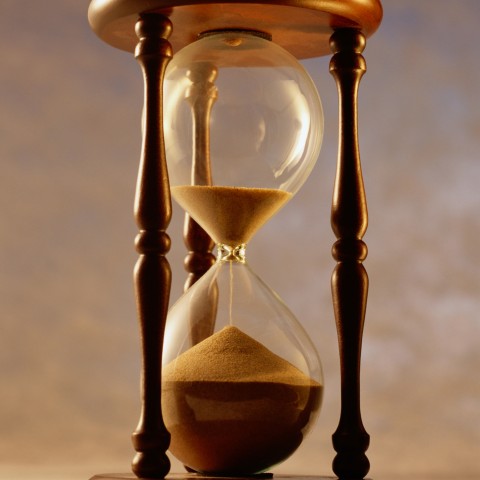
Una vecchia clessidra (“An old hourglass”)
There’s no equivalent for “o’clock” in Italian. You simply say the time, and if you want to be very precise, you add in punto. You’ll only use this if you want to remark that it just turned exactly that time: Ci vediamo alle tre in punto! (“We meet at three o’clock (sharp)!”).
To state what time it is, you use the verb essere (“to be”), in the singular è, for midnight (mezzanotte), midday (mezzogiorno), and one o’clock (l’una). The rest of the time, you use the plural sono and the number equivalent to the hour.
But if you want to say what time something happens, you use a/alle and the time, like this: a mezzanotte (“At midnight”), alle tre (“at three”). Remember that alle = a + le. Do you need to brush up on compound prepositions? Follow me!
| È mezzanotte / A mezzanotte | “It’s midnight” / “At midnight” |
| È l’una (di notte) / All’una (di notte) | “It’s one AM” / “At one AM” |
| Sono le due (di notte) / Allle due (di notte) | “It’s two AM” / “At two AM” |
| Sono le tre (di notte) / Alle tre (di notte) | “It’s three AM” / “At three AM” |
| Sono le quattro (di notte) / Alle quattro (di notte) | “It’s four AM” / “At four AM” |
| Sono le cinque (di mattina) / Alle cinque (di mattina) | “It’s five AM” / “At five AM” |
| Sono le sei (di mattina) / Alle sei (di mattina) | “It’s six AM” / “At six AM” |
| Sono le sette (di mattina) / Alle sette (di mattina) | “It’s seven AM” / “At seven AM” |
| Sono le otto (di mattina) / Alle otto (di mattina) | “It’s eight AM” / “At eight AM” |
| Sono le nove (di mattina) / Alle nove (di mattina) | “It’s nine AM” / “At nine AM” |
| Sono le dieci (di mattina) / Alle dieci (di mattina) | “It’s ten AM” / “At ten AM”` |
| Sono le undici (di mattina) / Alle undici (di mattina) | “It’s eleven AM” / “At eleven AM” |
| È mezzogiorno / A mezzogiorno | “It’s noon” / “At noon” |
| È l’una / All’una | “It’s one PM” / “At one PM” |
| Sono le due (di pomeriggio) / Alle due (di pomeriggio) | “It’s two PM” / “At two PM” |
| Sono le tre (di pomeriggio) / Alle tre (di pomeriggio) | “It’s three PM” / “At three PM” |
| Sono le quattro (di pomeriggio) / Alle quattro (di pomeriggio) | “It’s four PM” / “At four PM” |
| Sono le cinque (di pomeriggio) / Alle cinque (di pomeriggio) | “It’s five PM” / “At five PM” |
| Sono le sei (di pomeriggio) / Alle sei (di pomeriggio) | “It’s six PM” / “At six PM” |
| Sono le sette (di sera) / Alle sette (di sera) | “It’s seven PM” / “At seven PM” |
| Sono le otto (di sera) / Alle otto (di sera) | “It’s eight PM” / “At eight PM” |
| Sono le nove (di sera) / Alle nove (di sera) | “It’s nine PM” / “At nine PM” |
| Sono le dieci (di sera) / Alle dieci (di sera) | “It’s ten PM” / “At ten PM” |
| Sono le undici (di sera) / Alle undici (di sera) | “It’s eleven PM” / “At eleven PM” |
Naturally, it’s another matter to know how to write the time in Italian…. Here’s a hint: right now, it’s 11:33.

È ora di pranzo! (“It’s lunchtime!”)
You’ll often find Italians referring to noon or one PM as l’ora di pranzo, meaning “lunchtime.” When it’s time to eat, it’s a sacred time for Italians. So, just a word of advice: avoid planning a meeting around that time unless you’re making plans for a lunch or dinner. Also, remember that the typical time for meals changes according to the region in Italy. Generally, people in the north have lunch around noon, while the more south you go, the later lunchtime (or dinnertime) is, especially in the summer.
3. Give Me a Minute…

A minute isn’t much, but we use the word all the time, both as a reference to sixty seconds and a more generic “little time.”
Kids will always tell you un minuto… cinque minuti… (“one minute… five minutes… “) when you ask them to get out of bed or clean their room, don’t they?
- Sono le otto, alzati! “It’s eight o’clock, get up!”
- Ho sonno… ancora cinque minuti… “I’m sleepy…five more minutes….”
It’s also the typical excuse for the chronic latecomer…
- Ciao, sei pronto? “Hello, are you ready?”
- Ehm…. Quasi… cinque minuti e arrivo… “Ehm…almost…five minutes and I’ll be there…”
Here are a few more useful formulas. Notice how the verb is in the imperative mood. You can practice with these phrases:
Dammi un minuto… “Give me a minute…”
Aspetta un minuto… “Wait a minute…”
The same formulas can be used with secondo, meaning “second.”
But in fact, apart from when we talk about cinque minuti or dieci minuti (“five minutes” or “ten minutes”), we rarely use the word “minute” in a sentence. See how it works in the case of 6:05 PM:
- Che ore sono? (“What time is it?”)
- Sono le sei e cinque. (“It’s five past six.”)
We’ll look at this more in the following chapter.
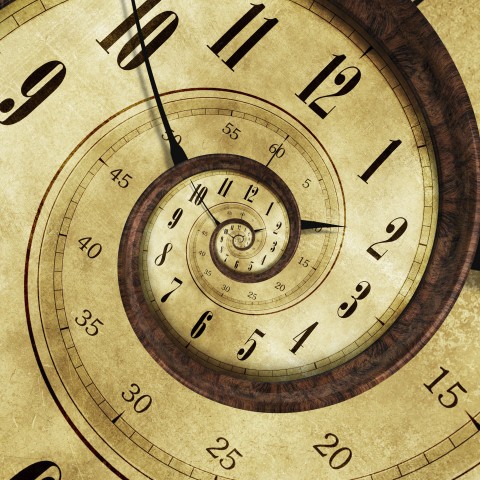
Ore e minuti (“Hours and minutes”)
4. How to Divide Hours into Minutes in Italian
When the digital watches came around, a lot of people started telling time like robots:
- Che ore sono? (“What time is it?”)
- Sono le 17 e 27. (“It’s 17: 27.”)
But luckily, people soon realized it was too ugly and stopped doing that. The normal behavior now is to round up the minutes to halves, quarters, and fives. Much better!
- mezz’ora (“half an hour”)
Notice how in front of ora, the word mezza drops the last letter, a, and adds an apostrophe (‘), becoming mezz’ora. But whenever you need to put it after the hour, to mean “half past…” then you use the complete word, either mezzo or mezza.
- … e mezza/mezzo (“half past…”)
In this case, telling time in Italian is much simpler than in English. You just need to put together the hour and the half hour with the conjunction e. Notice how both mezzo and mezza are correct.
- un quarto d’ora (“a quarter of an hour”)
Notice how here, too, we drop a letter and add an apostrophe, so that un quarto di ora becomes much nicer to hear and pronounce: un quarto d’ora.
- … e un quarto (“a quarter past …”)
To add just a quarter of an hour, you also need to put the conjunction e + un (indefinite article).
- Just like in English, an easy way to tell time is by fractions of five minutes, as in:
- le … e cinque (“five past …” or “… oh five”)
- le … e dieci (“ten past …” or “… ten”)
- le … e quindici (“fifteen past …” or “… fifteen”)
le … e venti (“twenty past …” or “… twenty”)
- le … e venticinque (“twenty-five past …” or “… twenty-five”)
- le … e trenta (“thirty past …” or “… thirty”)
- le … e trentacinque (“thirty-five past …” or “… thirty-five”)
- le … e quaranta (“forty past …” or “… forty”)
- le … e quarantacinque (“forty-five past …” or “… forty-five”)
- le … e cinquanta (“fifty past …” or “… fifty”)
- le … e cinquantacinque (“fifty-five past …” or “… fifty-five”)
- meno…
After half past thirty-five, normally in Italian you start saying the following hour “minus” the minutes needed to get to the top of the hour. For example:
- 10:40 = le undici meno venti (literally “eleven minus twenty”)
- 11:45 = le dodici/mezzogiorno meno un quarto (“twelve/noon minus a quarter”)
- 15:50 = le quattro meno dieci (“four minus ten”)
- 19:55 = le otto meno cinque (“eight minus five”)
5. General Time References of the Day in Italian
Telling the exact time, or being able to read a clock, is important. But since prehistoric times, people have talked about time by referring to the different stages of the day. So, if you want to have a more natural Italian conversation, here are the most common ways to give the general time of day in Italian.
Let’s remember that AM / PM isn’t commonly used in Italian. Instead, to avoid ambiguity or confusion, you’ll hear people mention di mattina, del pomeriggio, di sera, and di notte (“in the morning, in the afternoon, in the evening, at night”) after the time. These are the four basic stages of the day, but below is a more complete list of phrases using all the different parts of the day.

Dall’alba al tramonto (“from dawn to dusk”)
| Sono uscita di mattina presto. | “I left early in the morning.“ |
| Faccio colazione a metà mattinata. | “I have breakfast mid-morning.” |
| Mi sveglio sempre all’alba. | “I always wake up at dawn.” |
| Ci vediamo a mezzogiorno (ad ora di pranzo). | “See you at noon (at lunchtime).” |
| Ti chiamo nel primo pomeriggio. | “I’ll call you in the early afternoon.” |
| La festa comincia nel tardo pomeriggio. | “The party starts in the late afternoon.” |
| Com’è bella la montagna al tramonto! | “How beautiful the mountain is at sunset!“ |
| Non esco mai di sera tardi. | “I never go out late at night.” |
| È ora di cena. | “It’s dinner time.” |
| Non si può fare rumore a notte fonda. | “No noise can be made in the middle of the night.“ |
| Ho sentito un rumore nel cuore della notte. | “I heard a noise in the dead of night.“ |
| È tardi: ora di dormire! | “It’s late: time for bed (nap time)!” |
6. Top Italian Time Adverbs
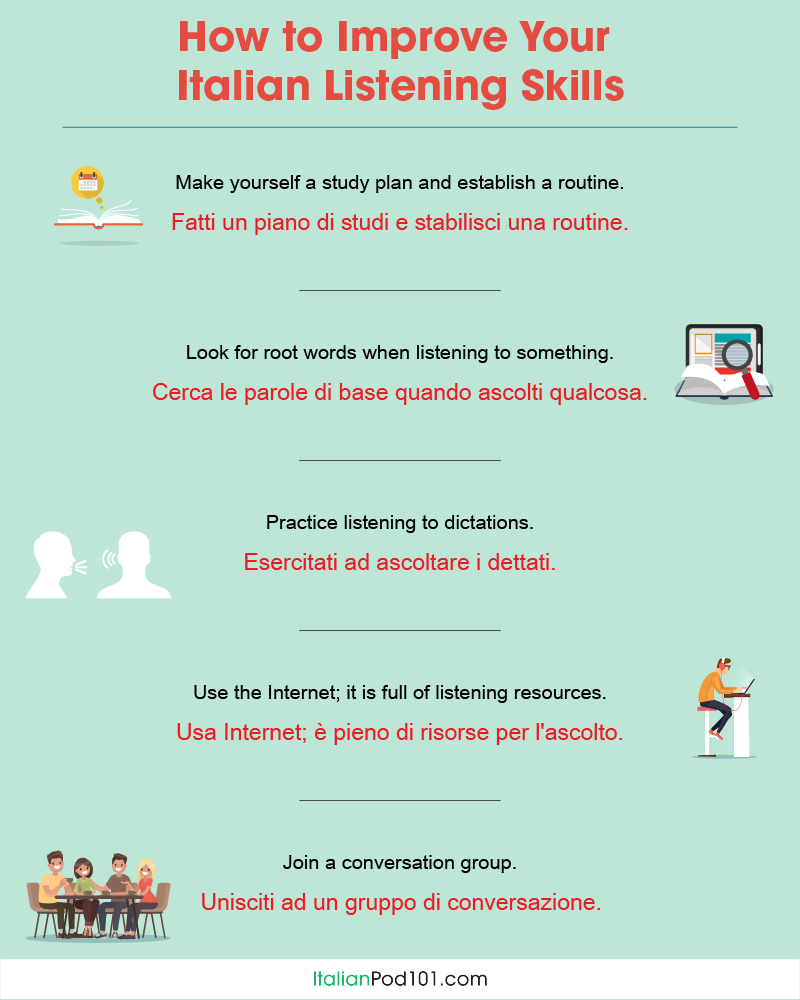
Once you’ve mastered how to say the time, how to talk about all the stages of the day and night, you still need some other little words that help you indicate when something happens. When talking about time in Italian, these adverbs of time will be immensely helpful:
- adesso/ora (“now”)
Il treno parte ora. (“The train leaves now.”)
- al momento (“at the moment”)
Al momento non abbiamo tavoli liberi. (“At the moment, we don’t have free tables.”)
- nel frattempo (“in the meantime”)
Nel frattempo preparo il pranzo. (“In the meantime, I’ll prepare lunch.”)
- prima/dopo (“before/after”)
Ci vediamo prima di cena o dopo cena? (“Shall we meet before dinner or after dinner?”)
- presto/tardi (“early/late”)
Per favore, arriva presto. Non fare tardi come al solito. (“Please, be there early. Don’t you be late as usual.”)
- tra un po’ (“In a while”)
Pay attention to the apostrophe (‘). It’s there to indicate that it was originally a longer word (poco) that dropped the last syllable.
Ora non ho voglia. Lo faccio tra un po’. (“Now I don’t want to. I’ll do it in a while.”)
- per molto/poco tempo (“for a long/short time”)
Per molto tempo ho creduto a Babbo Natale. (“For a long time, I believed in Santa Claus.”)
- sempre/mai (“always/never”)
- Vai sempre in palestra? (“Do you always go to the gym?”)
- No, non ci vado mai. (“No, I never go.”)
- il prima possibile (“as soon as possible”)
Ho bisogno della relazione il prima possibile. (“I need the report as soon as possible.”)
- in qualsiasi momento (“at any time”)
Può succedere in qualsiasi momento. (“It can happen at any time.”)
- di tanto in tanto (“from time to time”)
È bene fare una pausa di tanto in tanto. (“From time to time, it’s good to take a break.”)
7. Italian Proverbs and Sayings about Time
Time is such a universal and primordial concept that in all cultures, you’ll find many proverbs and sayings about it. Here are some of the most common proverbs and sayings about time in Italian.
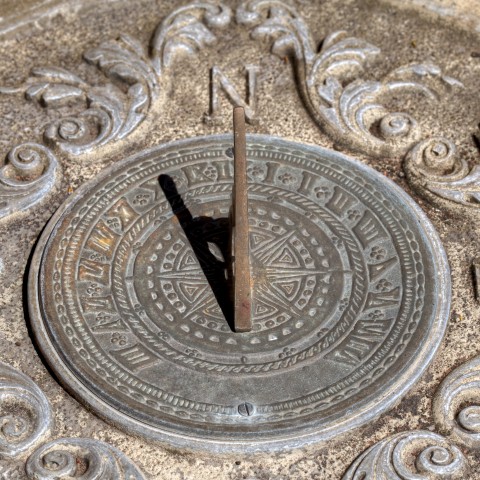
| Il tempo è denaro. | “Time is money.” |
| Il tempo vola. | “Time flies.” |
| Chi ha tempo non aspetti tempo. | “Those who have time do not wait for time.” Meaning: Basically, it’s an invitation to act immediately without hesitation. |
| La notte porta consiglio. | “The night brings counsel.” Meaning: The best decisions must be made with a clear mind, better if after a long sleep. |
| Dare tempo al tempo. | “Give time to time.” Meaning: Allow things to fall into place by waiting for the right moment. |
| Il tempo è galantuomo. | “Time is a gentleman.” Meaning: Time restores the truth, repairs all wrongs, and heals everything. Therefore, we must learn to wait. |
| Ora di punta. | “Rush hour.” Meaning: This literally means “peak hour” because it refers to a peak in a diagram. |
| Fare le ore piccole. | Literally “to make the small hours.” Meaning: It means to stay up or out until very late (one, two, or three). |
| Non vedo l’ora (che succeda…). | “I can’t wait (for something to happen).” |
8. Conclusion

I bet time flew while learning to tell time in Italian and more. Now you can practice telling time: make plans with your Italian friends, ask strangers for the time, or find out what time the movie starts.
But most importantly, don’t stop now! Go on and keep learning Italian with fun lessons and tons of podcasts and videos on ItalianPod101.com. We’ll help you improve quickly.
Before you go, practice telling time in Italian by dropping us a comment with the current time in Italian! We look forward to hearing from you!







